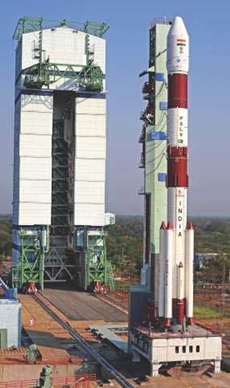Isro to launch 5 British satellites on 10 July
06 Jul 2015
Indian Space Research Organisation (Isro) will launch five British satellites, including three identical DMC3 optical earth observation satellites and two auxiliary technology demonstration satellites - a microsatellite CBNT-1 and nano satellite De-OrbitSail, on 10 July.
 Built by Surrey Satellite Technology Limited (SSTL), United Kingdom (UK), DMC3 satellites are 3 metre tall and weigh 447 kg each. The micro satellite CBNT-1 weighs 91 kg and the nano satellite De-OrbitSail weighs 7 kg
Built by Surrey Satellite Technology Limited (SSTL), United Kingdom (UK), DMC3 satellites are 3 metre tall and weigh 447 kg each. The micro satellite CBNT-1 weighs 91 kg and the nano satellite De-OrbitSail weighs 7 kg
The five satellites will be launched from the Satish Dhawan Space Centre (SDSC) in Sriharikota.
With the overall lift-off mass of the five satellites amounting to about 1,440 kg, this mission becomes the heaviest commercial mission ever undertaken by Isro and its commercial arm, Antrix Corporation.
In a statement, Isro chief AS Kiran Kumar said that Indian scientists had successfully completed the difficult task of mounting the heavy weights on Polar Satellite Launch Vehicle (PSLV).
''Accommodating the three DMC3 satellites each with a height of about 3 metre within the existing payload fairing of PSLV, was a challenge. To mount these satellites onto the launcher, a circular launcher adaptor called as L-adaptor and a triangular deck called Multiple Satellite Adapter-Version 2 (MSA-V2), were newly designed and realised by ISRO for this specific purpose.
The five satellites are being launched as part of the arrangement between DMC International Imaging (DMCii), a wholly owned subsidiary of SSTL of the UK and Antrix Corporation Limited (Antrix).
The DMC3 constellation, comprising of three advanced mini-satellites DMC3-1, DMC3-2 and DMC3-3, is designed to address the need for simultaneous high spatial resolution and high temporal resolution optical earth observation.
Launched into a single low-earth orbit plane and phased with a separation of 120° between them, these satellites can image any target on the Earth's surface every day. Their major applications include surveying the resources on earth and its environment, managing urban infrastructure and monitoring disasters.
CBNT-1, weighing 91 kg, is an optical earth observation technology demonstration micro satellite built by SSTL. The 7 kg De-orbitSail from Surrey Space Centre, is an experimental nano satellite for demonstration of large thin membrane sail and drag deorbiting using this sail.
France's SPOT 7 satellite, which weighed 714 kg, launched on 30 June last year, was the heaviest foreign satellite carried by Isro's PSLV until now.




















